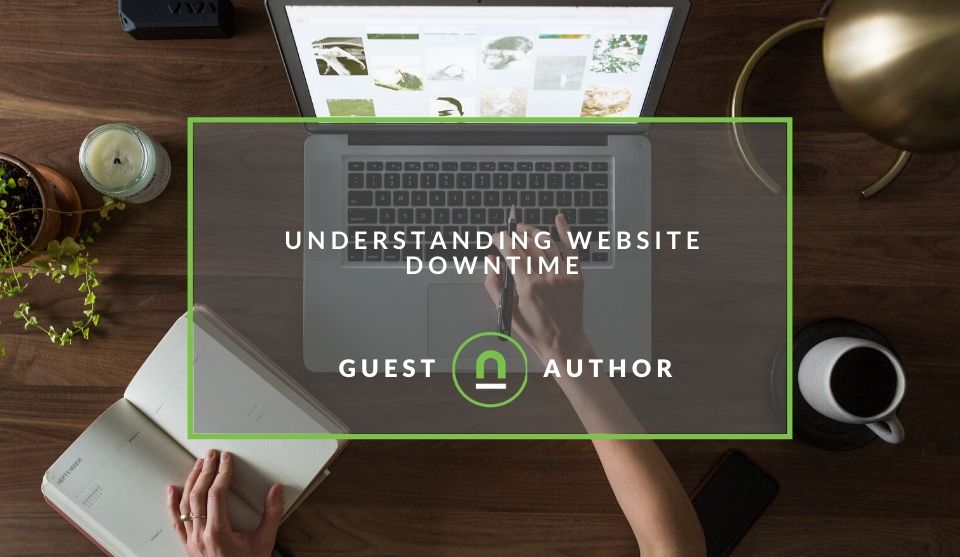Recent posts

Mind, Body & Soul
Do Not Whistle at Night: South Africas Strangest Superstitions
26 April 2025

Geek Chic
How to Replace A Broken Lenovo Laptop Screen
24 April 2025

Money Talks
Everything You Need to Know About SASSA Status Check
13 April 2025

Mind, Body & Soul
The Genetic Diversity of Cannabis Seeds
12 April 2025
Popular posts
Extravaganza
Trending Music Hashtags To Get Your Posts Noticed
24 August 2018
Geek Chic
How To Fix iPhone/iPad Only Charging In Certain Positions
05 July 2020
Extravaganza
Trending Wedding Hashtags To Get Your Posts Noticed
18 September 2018
Money Talks
How To Find Coupons & Vouchers Online In South Africa
28 March 2019
Understanding Website Downtime
06 July 2020 | 0 comments | Posted by Konrad Caban in Industry Experts
When a website isn’t available or not functioning well, visitors aren’t able to access the content on it or complete their intended actions on it. This behaviour on the part of the website is known as “downtime”. Downtime doesn’t always mean a website is entirely unavailable. It could also imply that the main pages are loading, but some essential features like checkout or download aren’t working.
That’s just an example. Downtime could impact any aspect of a website. In fact, during website downtime, you may see errors like “Service temporarily unavailable”, “Couldn’t find the page”, “500-error – the website is temporarily unavailable”, or “Service unavailable – DNS failure”. All websites strive for zero downtime, but the mishap is inevitable.
You would be surprised to know that even Internet giants like Google and Facebook experience downtime occasionally. Though technology has improved a lot and website hosting service providers have systems in place to prevent website downtime, unforeseen circumstances can still cause websites to become unavailable for some time.
If you look at the uptime guarantee offered by different web-hosting services, you can see figures like 99% or 99.9%, but no one guarantees 100% website uptime. This is a solid example that website downtime is inevitable.
Why is it vital to prevent website downtime?
When you’re running an online business, every second counts, and it doesn’t matter what time of the day a visitor visits a page on your business’s website. If a potential client wants to access your site, and it is experiencing downtime at that moment, the client could be motivated to switch to a competitor of your business who is offering a similar service.
Thus, website downtime could cause you losses.
The following are some more adverse effects of website downtime
Reduced Search Engine Rankings
If your website is experiencing downtime when Google indexes it, and the search engine encounters a 503 response, or a 500 internal error, your SEO is adjusted accordingly. The longer downtime your website experiences (and throws an error code), the more Google penalizes your search engine rankings. Creates an overall negative user experience
The most apparent impact of website downtime is that it prevents potential customers from using your services. Every time a visitor clicks away from your website because it is down, it adds up to your bounce rate.
A negative bounce rate brings your search engine rankings drastically down.
Tarnish brand reputation and credibility
Website downtime has a significant impact on the brand’s reputation and credibility. According to research, millennial users are unforgiving customers. Almost 57% of people in this age group have agreed that website downtime causes negative perceptions of the brand in their mind.
A study showed that if customers find that a website is down for the second time, they might never revisit it. A non-functioning or poor-functioning website immediately damages the brand’s reputation.
Customers consider website downtime as an example of a poorly managed business and perceive it as unprofessional.
Loss of revenue and potential client opportunities
When your website experiences downtime, naturally, the customers cannot use it. This means they cannot order products or conduct any research on it to make a purchase decision. All this causes a loss of revenue.
Reasons website go down
Now let’s try to decode the reasons behind website downtime.
Poor hosting services/Server-side issues
The old proverb “you get what you pay for” holds true in the case of website hosting services. While selecting a web hosting provider if your primary concern is the least amount and not an excellent uptime guarantee, you’re more likely to face server-side issues that translate into website downtime.
Shared server – if your website is hosted on a shared server, there’s no guarantee that it will always have access to the resources it needs for normal functioning. In some cases, another website on the shared server monopolizes on the resources (RAM, bandwidth, processor power), thereby impacting your site’s availability.
Traffic surge – every server has a limited bandwidth to handle the traffic. If there’s a traffic surge, hosting providers that offer the most inexpensive services will most likely not have a system or procedures in place to handle it. The result would be your website experiencing more crashes due to traffic load.
Third-party software
Using third-party software or plugins can enhance the functionality of your website. However, sometimes they can cause issues with their normal functioning. Third-party software integration is thus an important factor. Some software may not integrate well with your website and cause performance issues. In such a case, users will experience problems accessing your website or performing basic tasks on it.
Hacks & viruses
Internet technology is continuously evolving, and so are security threats. With advanced tools, it’s easier for hackers to gain a backdoor entry into your website and force it to become down. When a virus is planted in your website code, or someone has hacked into your website, it can go offline for an indefinite period.
Failure to renew domain or SSL certificate
SSL certificate errors are common. Many websites go down after SSL installation. The reason behind this is the change of IP address. An SSL certificate requires a dedicated IP which replaces your current IP address, and several technical aspects are carried out in the procedure. Some of the issues related to SSL certificates are missing private keys, SAN Compatibility, and invalid CSR, to name a few.
Additionally, failure to renew the domain on time leads to it being put on hold and becoming inactive in your hosting account, leading to website inaccessibility.
Poor website speed
Poor website speed can be due to slow hosting services, bloated or poorly written scripts, or errors in CSS or HTML codes. In many cases, the user sees a spinning wheel, and the browser shows some error code.
Database failure
The growing importance of databases on websites can be seen everywhere. A database failure can cause a website dearly and prevent its normal functioning. DNS plays an important role in the efficient loading of your website. A poor DNS service can affect website uptime, speed, and security.
Hardware issues
Hardware issues account for 50% website downtime events. There is always a possibility of a hardware component in the server failing unexpectedly. To deal with such problems, leading hosting services use multiple power supplies, network controllers, and multiple levels of hardware redundancy.
User error or careless coding
A bad piece of website code can hit your website in the worst manner, which can result in website downtime. However, this can be avoided. Simple mistakes in written code and lack of experience are some of the reasons behind careless website programming. Several tools can check the performance of your code. If your website is down due to coding errors, get it fixed as soon as possible.
How to prevent website downtime?
There are many ways to reduce the likelihood of website downtime.
Use cloud servers
Cloud servers are a popular choice for businesses. A cloud server has dedicated resources to run different websites hosted on it. With your website hosted on a cloud server, you don’t have to worry about it going offline unexpectedly because such a server has more resources available to enhance website accessibility. Even a mobile edition of your website would run fast on a cloud server.
Cloud servers have high scalability, so if your website experiences a sudden influx of visitors, the server can expand the resource availability quickly and prevent crashes.
Use CDN
A CDN can serve a cached version of your website to users when your website experiences downtime. CDNs cache content in their global servers and serve it to the users to give the impression that a website is always working. A CDN also offers load balancing, which can be useful when your website is experiencing a sudden surge in traffic, and the main server cannot handle more connections.
Use high-availability systems with redundant elements
A high availability system offers maximum potential uptime to websites. A system with high-availability is designed to eliminate single points of failure. Even if one component in the system fails, the application does not go down. High-availability systems aim for 99.999% uptime. Such systems have three typical characteristics – redundancy, monitoring, and failover.
- Redundancy means there are multiple components in the system to perform a certain task
- The systems monitor itself and ensure all components are working properly
- Failover is a process where the secondary component becomes primary due to failure of the primary component
Here are some additional things you can do to minimize the likelihood of website downtime
Procedures and training
Website downtime can be a stressful event. Hence, you need to train your staff to handle such mishaps and also have a proper plan in place that will reduce the time to get your website live again. You need to have clearly defined roles in your IT department and designate the people who should be alerted when the website goes down. A checklist of immediate actions to be taken in such an event also needs to be devised.
Reliable website monitoring
According to experts, external monitoring is always more reliable than internal monitoring. External website monitoring includes keeping tabs and gaining instant insights on website uptime and performance, among other aspects. It combines synthetic and real user monitoring for ultimate visibility. Real user monitoring can help you gain visibility of how end users are interacting with and experiencing your website. On the other hand, synthetic monitoring simulates visitor’s interaction with your site to provide reliable insights into uptime performance.
To gain an understanding of popular website monitoring tools from across the world, have a look at this concise infographic: 
Source: Website Monitoring Tools market in 2020 (infographic)
Wrapping it up
Increased competition has made website downtime a serious threat to business. The event tarnishes your brand’s reputation, leads to customer dissatisfaction, loss in revenue, and loss of potential clients. A website is the face of your brand. It’s also the first and most important touch-point for new users in the journey of connecting to your brand. Hence, you need to ensure your website is always available to serve your customers and ensuring uptime should be your topmost priority.
Tell us your story
Would you like to write for nichemarket just like Konrad has? Find out how to submit a guest post and when you're ready, you can contact us.
Contact us
If you would like us to improve the advertising for your site or want to know more about digital marketing for your business, then don’t be shy we’re happy to assist. Simply contact us
Are you looking to promote your business?
South African Business owners can create your free business listing on nichemarket. The more information you provide about your business, the easier it will be for your customers to find you online. Registering with nichemarket is easy; all you will need to do is head over to our sign up form and follow the instructions.
If you require a more detailed guide on how to create your profile or your listing, then we highly recommend you check out the following articles.
Recommended reading
If you enjoyed this post and have a little extra time to dive deeper down the rabbit hole, why not check out the following posts on websites.
You might also like
How Small Businesses Can Leverage Blockchain Technology
02 April 2025
Posted by Nicholas Tay in Money Talks
Unlock growth with blockchain! Discover how small businesses can use this tech for secure transactions, supply chain transparency and innovative solu...
Read moreHow to Replace A Broken Lenovo Laptop Screen
24 April 2025
Posted by Bethany Lawrance in Geek Chic
Replacing a broken Lenovo laptop screen is easier than you think! Our step-by-step guide walks you through the process. Save money and DIY!
Read more{{comment.sUserName}}
{{comment.iDayLastEdit}} day ago
{{comment.iDayLastEdit}} days ago
 {{blogcategory.sCategoryName}}
{{blogcategory.sCategoryName}}

